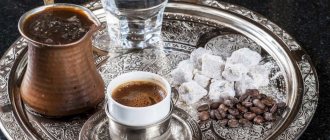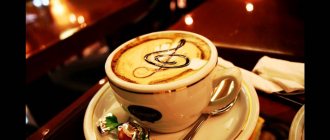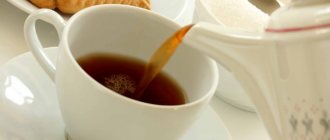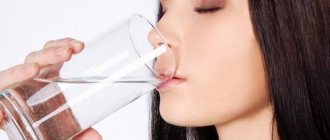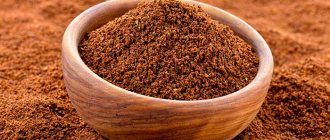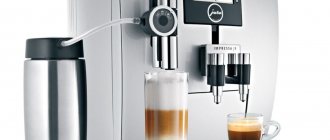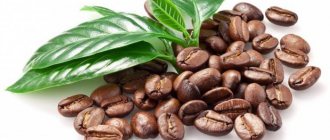Once in a coffee shop or restaurant, visitors often wonder why they are served a glass of water with their espresso. Connoisseurs of taste who are meticulous about the process of preparing a drink from coffee grinder to coffee maker, as well as its tasting, will appreciate this approach.
Many people know that it is correct to drink coffee with water, but the reason for this tandem is not known to everyone. Where does such an unusual tradition come from and what is it for?
It is believed that cold water was served with coffee for the first time in Greece. Supporters of this version explain such an unusual combination by the hot climate of the country and the opportunity to freshen up after a hot drink. In Turkey, the custom of serving a glass of water along with coffee also took root, from where it was brought to Europe. Later, in Vienna, the tradition was reinvented in a European way and Viennese coffee began to accompany a glass of water.
After coffee I want to drink water
Experts count several reasons for feeling thirsty after drinking coffee:
- The invigorating drink dehydrates the body due to its diuretic properties. This negatively affects the mucous and skin tissues. This is where the tradition of serving slightly cool water with espresso arose;
- It has a bright and rich taste, as well as characteristic sourness and bitterness. To dilute the sugariness a little and experience all the peculiarities of taste, it is advisable to alternate drinking the drink with water. Subsequently, you will not feel thirsty. Also, water helps cleanse the taste buds, which allows you to re-experience all the features of an invigorating drink;
- If in a cafe they bring you a glass of water along with your coffee, you should not ignore this gesture. Water after an invigorating drink will help protect tooth enamel from the characteristic yellow plaque;
- contain a large amount of caffeine. When drinking double espresso, don't forget about water. This will protect the cardiovascular system from heavy loads and prevent dehydration.
Drinks prohibited during the keto diet
Here are some of the most common examples of drinks to avoid on keto:
- Fruit Juice - 140 calories, 38 grams carbs, 38 grams net carbs in each cup of 100% grape juice.
- Soda - 93 calories, 26 grams carbs, 26 grams net carbs in each cup of Coca-Cola.
- Soda (Reduced Sugar) - 60 calories, 16 grams carbs, 16 grams net carbs in each cup of Coca-Cola Life.
- Vitamin Water - 48 calories, 13g carbs, 13g net carbs per cup.
- Sweet tea - 90 calories, 23 grams of total carbs and 23 grams of net carbs in each cup of sweet tea.
It’s almost impossible to talk about all the drinks that are prohibited during keto. Just try to be careful and read labels. As a general rule, if a drink contains more than 8 grams of carbohydrates per serving, you should avoid it.
How to drink coffee with water - serving rules
Many people wonder how to drink coffee with water correctly and what liquid is best to choose. In most cases, coffee lovers use bottled water, mineral water and, in some cases, boiled water.
Also, there are certain submission rules:
- Coffee is served hot, and the water temperature should not be lower than +10 degrees. This helps protect tooth enamel from microcracks;
- You need to drink water slowly, in small sips. After drinking coffee, try to rinse your mouth completely;
- According to the rules of etiquette, water should be served in a glass with high walls, and it should not be filled to the brim;
- On hot days, it is customary to add juice or a slice of lemon or lime to the water. This helps cool the body and quenches thirst;
- Experts recommend drinking some water after drinking coffee. It helps reduce the load on internal organs.
The effect of coffee drink on the body
Instant and brewed coffee generally affect the human body. This action can be both positive and negative, it all depends on the specific case and the general state of health.
Instant coffee has a less strong effect on humans, unlike natural coffee, because it contains only 10% caffeine. Some people feel drowsy after coffee, so it is necessary to drink large quantities of water after coffee to neutralize the effect. Be sure to try drinking coffee with water and get an unforgettable experience from the process and discover new taste characteristics of the drink.
In decent cafes and restaurants in many European countries, it is customary to serve a glass of cold water along with a serving of coffee. On the menus of popular French and Italian establishments you can even see a note specially made for tourists: “Don’t order water! It will be served with coffee.” There is a heated debate among coffee lovers about the order in which you should drink coffee and water.
Let's sum it up
The quality of coffee and the condition of the equipment largely depend on the degree of purification and mineral composition of the water. The use of ordinary tap water is excluded, since it contains chlorine. It spoils the taste of any type of coffee beans and gives an unpleasant taste and smell. In addition, the composition of the liquid in each region is different, determined by the hydrogeological conditions of the area.
The solution to the problem may be the use of cleaning systems. These are expensive installations that require frequent filter changes. The more complex and expensive the model, the higher the degree of water purification. However, you can solve the issue in a simpler and more affordable way - use bottled water. It has already undergone all operations to remove suspended matter, disinfection and other processing procedures. The use of such water guarantees the high quality of the drink and the safety of kitchen equipment.
How did the tradition of drinking coffee with water originate?
To become a gourmet, you need money and time. Therefore, the custom of slowly sipping coffee, washing down each sip with water, originated in the palaces of Arab nobles. Then in the 16th century the Turks adopted this habit, and from them the Greeks.
In hot countries, alternating hot coffee with cold well or spring water is pleasant and healthy: water not only refreshes the receptors, sharpening the perception of taste, but also quenches thirst and prevents dehydration.
However, in Western Europe, where the climate is colder, the custom of serving coffee with water appeared much later, around the end of the 19th century. It is believed that the fashion for this method of serving originated in Austria.
The prim, noble ladies who ordered it experienced serious difficulties because of the coffee spoon. Placing it, smeared in coffee and cream, on the edge of the saucer seemed terribly inelegant, and the only way to clean the spoon - by licking it - was even worse. Therefore, coffee shops began to serve a glass of water along with coffee, in which adherents of strict etiquette could rinse the coffee spoon.
Later, other uses were found for water. In those days, visitors spent a lot of time in coffee shops, reading newspapers or discussing the latest news. Not everyone’s health allowed them to drink several servings of strong coffee in a row. The elderly gentlemen found a way out: they ordered just one cup of coffee and drank it for the rest of the evening, in small sips, alternating with water. Over time, the custom was adopted in Germany, France and Italy.
Carbonate
When it comes to maintaining acidity levels in a balanced coffee, you need to have the right amount of carbonate compound. When there is the ideal amount of carbonate, the acid levels are balanced so the drink does not taste bitter. If the levels of the carbonate compound are too high, the acid it has absorbed will be released back into the coffee. While carbonate at low levels is needed for the best tasting coffee. It can also cause problems with your equipment if the water has a high concentration of calcium. When exposed to heat, calcium carbonate can form. This can clog and damage even the best coffee machine.
Preparing a great cup of coffee for tasting is an art and a science. While many believe their extraction method is the best, the type of coffee water they use is just as important as the method itself.
If you find an error, please select a piece of text and press Ctrl+Enter.
How they drink coffee with water in different countries
In Greece and Turkey, the most popular type of coffee is Turkish brewed. Here it is still customary to refresh the receptors with water before each sip of coffee. In Greece, cold water is served free of charge to any customer who has just entered the establishment even before he places an order.
In Italy, with its cult of espresso, a slightly different tradition of drinking coffee with water has developed. In the South, especially in Naples and Sicily, it is customary to take a large sip of water before drinking coffee. It is considered acceptable to drink coffee with water only if you do not like the drink and want to remove the unpleasant aftertaste. If a customer drinks water with his coffee, the barista takes it as an insult.
In the northern regions, except for Piedmont, drinking coffee with water is much more tolerant. In Rome and Milan, in general, coffee with water is not served everywhere.
In Spain they also prefer to drink water before rather than after coffee. Although black coffee here is significantly inferior in popularity to cortado (coffee with milk), which is not served with water.
In France, there is always a jug of water on the table during meals (both at home and in a restaurant). Everyone pours themselves as much as they want. A customer who orders coffee is always brought a large glass of water. French baristas believe that water should be drunk before coffee, not after it.
In Germany, coffee is often served with sparkling water. The Germans do not have clear rules about drinking water before or after coffee.
In Scandinavian countries, boiling water is sometimes served instead of cold water. If desired, the guest dilutes the coffee with it.
Types of coffee served with water:
- espresso and all its varieties (lungo, ristretto, Americano);
- any black coffee brewed using a hot method;
- macchiato;
- Viennese coffee;
- black coffee with yolks.
Water is not served with coffee and milkshakes, even if there is no milk in it.
How to choose?
According to the composition on the label. It is not necessary to check all the parameters with the table from the previous paragraph, but pay attention to the overall mineralization. Manufacturers usually indicate a range of TDS values. At home, the actual TDS can be measured with the simplest pocket TDS meter (salinity meter, conductivity meter).
Why is water from a source or well not suitable? Due to increased rigidity. Groundwater dissolves rocks containing calcium and magnesium (limestones and dolomites), so they are harder than surface water. At the same time, the hardness of surface waters is subject to seasonal fluctuations: the minimum hardness occurs in the spring, when the sources are replenished by melting snow and rain, and the maximum in the winter.
What about tap water? It is different in different regions, so I cannot draw general conclusions here: you need to experiment. I will only say that tap water is also subject to seasonal fluctuations in hardness. At my house, coffee made with Aquaphor-filtered tap water turns out less tasty than bottled water.
Choice of water
Properties of water for serving with coffee:
- softness. Water can be bottled, well, spring, but in no case chlorinated or distilled;
- temperature – from +10 to +15 °C, in hot weather it can reach +20 °C.
Water is served in a tall glass goblet. Sometimes a few drops of lemon or other fruit juice or a little herbal infusion are added to it. The main thing is that all the ingredients are natural, no sugar or sweeteners! But even natural flavoring additives must be handled with extreme caution so that they do not suppress the sourness in the taste of coffee. Usually, juices and decoctions are mixed with water only if coffee is prepared according to an original recipe and they want to emphasize some shades in the taste of the drink.
Recipe No. 3. Coffee marinade
Shish kebab in coffee marinade.
Photo by the author of the text Here we fell into a bit of a stupor. Anything is associated with meat, but not coffee. And yet:
- Onions – 2 pcs.
- Olive oil – 2 tbsp. spoons
- Salt – 0.5 teaspoon
- Spices - to taste
- Ground coffee – 1 tbsp. spoon
It is necessary to keep the meat in the coffee marinade for at least 6 hours. Cut the onion into rings and place in a pan with meat. Add olive oil and ground pepper. They didn’t dare add anything else.
We brew the coffee for the marinade in a Turk: add a tablespoon of coffee to 0.5 liters of water, put it on low heat so that it doesn’t “run away,” wait until the drink starts to rise and remove from the heat without bringing it to a boil. Dissolve half a teaspoon of salt in a Turk and pour the resulting brew into the meat through a fine strainer or cheesecloth. Let the marinade cool at room temperature, put it in the refrigerator overnight, and go to bed with a bad feeling.
Such a frightening coffee marinade, surprisingly, did not spoil the meat. The taste of coffee was not felt at all. The meat turned out soft, with an interesting “sourness”.
Comparison of methods of drinking coffee with water
Even world-famous experts cannot come to a consensus on how to drink coffee with water. Let's consider the arguments of both sides.
Why do they suggest drinking coffee with water?
- Caffeine has a diuretic effect, so it promotes dehydration. By washing down a serving of coffee with a large glass of water, a person restores water balance.
- If you drink a lot of water immediately after coffee, the liquids will mix in the stomach and the effect of caffeine on the cardiovascular system will be weakened.
- Water supposedly washes away yellow plaque from teeth.
Disadvantages of this method:
- As a rule, plaque forms on teeth when you don’t brush them too thoroughly. To remove plaque, it is better to consult a dentist; an extra sip of water is unlikely to help.
- If you drink hot coffee with a glass of cold water (in bars it is often cooled to +10 °C), the temperature contrast will negatively affect both tooth enamel and the throat.
- When you drink coffee with water, you lose the pleasure of the aftertaste.
Arguments from supporters of drinking water before coffee:
- Water cleanses the receptors, making taste better.
- A pleasant aftertaste remains.
- Once in the body, caffeine contributes to the narrowing of all blood vessels, except the renal ones, which, on the contrary, dilates. This effect lasts about 20 minutes, then the effect of caffeine weakens, but the influence of another alkaloid, theobromine, increases. As a result, the kidney vessels narrow, and all the others expand (at this moment, a slight nagging pain is sometimes felt). To prevent constriction of the blood vessels in the kidneys, you should drink a glass of water.
Sometimes a person, not knowing why water is used with coffee, drinks it right away, completely killing the aftertaste. It makes sense to do this only when the coffee has an unpleasant taste that you want to get rid of as quickly as possible.
Conclusion.
If you are satisfied with the taste of the drink, but you need to reduce the concentration of caffeine (to weaken its effect on the cardiovascular system), it is better to drink 100-150 ml of water before coffee. If a portion of coffee exceeds 15–25 ml, then take a large sip of water before each small sip of the drink. The last sip of coffee is not washed down, enjoying the aftertaste. After 20 minutes, you should drink 200–250 ml of water at room temperature.
Many people start their day with Turkish brewed or instant coffee. The invigorating taste and aroma of this drink help the body wake up and stimulate performance throughout the day.
There are a wide variety of ways to prepare a drink from coffee beans. Many countries have their own favorite recipes: Americano, latte, espresso, cappuccino, etc. The serving methods also differ. However, not all people know that it is possible and even necessary to drink coffee with water, washing it down with an aromatic drink.
In many restaurants and coffee shops today, a cup of an invigorating drink will be served with a glass of still mineral water. And aesthetics have nothing to do with it. Drinking coffee with water is not only advisable, but even necessary.
In order to understand why water is served with coffee, you need to delve into history and find out where this tradition came to us from.
Its roots can be found back in Ancient Greece. Here, for the first time, cold water was served with brewed coffee. Since Greece has a hot climate, it was supposed to help cool down after a hot drink.
This custom also took root in Turkey, although much later. Turks traditionally use copper cezves for cooking, which are heated in sand. This is how they get a bitter and strong drink, which they drink separately from food. Coffee brewed in this way had to be washed down with something cool and light to quench your thirst and remove the aftertaste.
Later this tradition spread throughout Europe. This is how the famous Viennese coffee appeared. And today in European coffee shops no one is surprised by a glass of mineral water served along with a cup of hot aromatic drink.
What to brew in
Filter coffee is not just one brewing method, but many different ones: drip coffee maker, pour-over, Aeropress, immersion funnel... They are united by the principle that gives the name to the method: the use of a paper, fabric or metal filter during the preparation process. This makes it possible to get a pure drink without suspension, reminiscent of strong tea or compote.
If you're about to start making filter coffee at home, take a look at a drip coffee maker. The brewing principle in it is simple: hot water seeps drop by drop through a layer of ground coffee. The main advantage of an electric drip coffee maker is that you can brew several servings at once with just one press of a button. The cooking process is automated: you select the grain, dosage and grinding, and the machine does the rest for you.
Four reasons why water is served with coffee
Researchers have identified 4 reasons that scientifically explain why it is better to drink coffee with cold water:
- The drink, brewed according to all the rules, has its own unique taste and aroma. But with each sip you drink, this taste becomes less vibrant due to the adaptation of taste buds to it. Refreshing water helps cleanse the latter, making each sip of the aromatic drink as rich and vibrant as the first.
- To avoid darkening of tooth enamel if you drink coffee frequently, you should drink it with water after each sip. It will wash away the pigment without giving it a chance to be absorbed.
- A glass of cold mineral water without gas, drunk in small sips after an aromatic drink in hot weather, will reduce the likelihood of overheating of the body.
- Doctors explain why you need to drink water after coffee, from their point of view. According to them, it helps not only lower blood pressure and normalize the heartbeat, but also prevent dehydration by replenishing fluid loss that occurs due to the fact that caffeine has a diuretic property.
Coffee beans contain 2 alkaloids that have opposite effects on the body: caffeine, contained in the outer shell; and theobromine, contained, respectively, in the internal. However, they do not affect the body at the same time.
Caffeine is the first to work, constricting the blood vessels of all organs except the kidneys - in them, the vessels, on the contrary, dilate. Thus, at the same time, blood pressure increases and the urge to urinate increases due to improved renal blood flow.
After 20-25 minutes, opposite processes begin in the body under the influence of theobromine: all blood vessels dilate, and the renal vessels narrow, which often causes an unpleasant pulling sensation in the lumbar region.
To prevent disruption of renal blood flow, doctors recommend drinking coffee 20 minutes after consumption.
Drinking instant coffee is even more important, since its production completely removes the outer shell of the bean, containing caffeine, and only uses the inner part, rich in theobromine.
Magnesium, calcium and sodium ions. All help in coffee extraction
When magnesium ions are present in water, it helps bring out fruity, tangy flavors, while creamy notes are highlighted by the presence of calcium. This metal ion also acts as a buffer and prevents acidic notes from flavoring the coffee.
When it comes to the effect of these ions on extraction, magnesium has the greatest impact, followed by calcium and then sodium. Even though the magnitude of their effects changes, the overall balance at the end is basically the same.
This means that to get the best flavor from your coffee grounds, you will need to use magnesium-rich water. It is also important to find the right balance between magnesium, calcium and sodium ions. According to research, you actually need all three ions to get the best flavored drink.
What kind of water is served with coffee?
The choice of cooling drink and the supply of water for coffee will depend only on the person’s personal preferences. It can be simply boiled, bottled, filtered, spring or mineral water with or without gas. The main thing is that it is chlorine-free and has a soft, neutral taste that cannot spoil the taste of the coffee drink.
However, there are also some nuances in drinking coffee with water that it is advisable not to ignore:
- Mineral water (or another option) should be served chilled, but not cold (optimal temperature - +10°C). If it is too cold, you can damage your tooth enamel, which does not like sudden changes in temperature of food and drinks.
- To enhance the cooling and thirst-quenching effect, on a hot day, after a cup of aromatic drink, you need to drink water with a slice of lemon or lime.
- They drink it in small sips, as if tasting it, while rinsing their mouth.
- It is recommended to serve in a tall glass filled approximately 2/3 full.
To prepare a coffee drink, experts (baristas) also recommend using soft water, since using hard water leads to the formation of scale and sediment.
Magnesium and calcium
These metals dissolve as charged particles when immersed in water and are found on the periodic table as Mg+2 and Ca+2. This positive charge is critical to the overall taste, as most compounds in coffee are negatively charged. This means that negative aromatic compounds will attract positively charged ions, effectively eliminating any bitter or unpleasant tastes. If you're wondering what "hard water" is, it simply means that it contains elevated levels of magnesium and calcium.
Conclusion: why you should drink water after coffee
Answering the question of why you need to drink water after coffee, the following main reasons can be given:
- to get rid of the bitter aftertaste of some types of coffee drink;
- to reduce the concentration of caffeine and, as a result, prevent an increase in blood pressure;
- to quench thirst on a hot day and prevent dehydration;
- to soften the taste of a coffee drink and prolong its aftertaste;
- for cleaning teeth from coffee plaque.
Connoisseurs claim that by alternating the cold freshness and bitterness of coffee beans, you can get different taste sensations. For example, in Europe and in the south, hot drinks are consumed differently.
In southern countries, in order to not only invigorate, but also refresh, a glass of cool water is drunk immediately after coffee in small sips. You can soften the taste of espresso and prolong its aftertaste by drinking half a glass before and half after an invigorating drink.
Europeans prefer to alternate sips of the aromatic drink with water, thereby cleansing the receptors and enjoying the brightness of the preserved taste.
The tradition of drinking water after coffee, dating back centuries, has taken root in our time. Not everyone does this. But how much more pleasant and healthy it can be to prolong the enjoyment of a coffee ceremony if a glass of cool water is served with this invigorating drink.
Once in a coffee shop or restaurant, visitors often wonder why they are served a glass of water with their espresso. Connoisseurs of taste who are meticulous about the process of preparing a drink from coffee grinder to coffee maker, as well as its tasting, will appreciate this approach.
Many people know that it is correct to drink coffee with water, but the reason for this tandem is not known to everyone. Where does such an unusual tradition come from and what is it for?
It is believed that cold water was served with coffee for the first time in Greece. Supporters of this version explain such an unusual combination by the hot climate of the country and the opportunity to freshen up after a hot drink. In Turkey, the custom of serving a glass of water along with coffee also took root, from where it was brought to Europe. Later, in Vienna, the tradition was reinvented in a European way and began to accompany a glass of water.
In southern and European countries, they drink water with espresso or just black coffee in different ways. Residents of Europe are more accustomed to alternating sips of coffee with water, while southerners start drinking water after a hot drink.
Each method of administration gives a different effect:
- If you drink a hot drink alternately with cold water, your taste buds will be cleansed. Each new sip of coffee is rich and bright;
- If you drink water after espresso, the dehydrating effect of coffee on the body is reduced and the coffee aftertaste is removed.
Why is drinking coffee with chilled water becoming increasingly popular?
Why do they drink?
drink water with coffee , pursuing different goals:
- to cleanse taste buds and enhance sensations;
- to refresh yourself and quench your thirst;
- to prevent the effect of dehydration and eliminate dark plaque on teeth.
It is also following the ancient traditions that came to us from the East. However, in Turkey, the birthplace of the coffee drink, water began to be served much later than in Ancient Greece, where the coffee ceremony originates.
